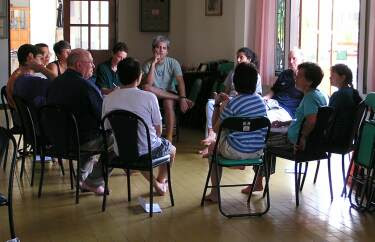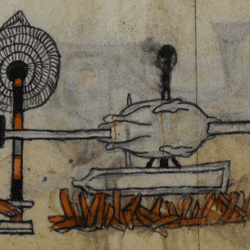
THE ART OF CONVERSATION
A Reflection on Spiritual Practices in Liberal Churches
James Ishmael Ford
11 October 2009
First Unitarian Church
Providence, Rhode Island
Text
I did not read books the first summer; I hoed beans. Nay, I often did better than this. There were times when I could not afford to sacrifice the bloom of the present moment to any work, whether of the head or hands. I love a broad margin to my life. Sometimes, in a summer morning, having taken my accustomed bath, I sat in my sunny doorway from sunrise till noon rapt in a revere, amidst the pines and hickories and sumacs, in undisturbed solitude and stillness, while the birds sang around or flitted noiseless through the house, until by the sun falling in at my west window, or the noise of some traveler’s wagon on the distant highway, I was reminded of the lapse of time. I grew in those seasons like corn in the night, and they were far better than any work of the hands would have been. They were not time subtracted from my life, but so much over and above my usual allowance. I realized what the Orientals mean by contemplation and the forsaking of works.
Henry David Thoreau, Walden, Or Life in the Woods
I was still serving our church in suburban Phoenix, so we’re talking something more than a decade ago. Tempus fugit, time does fly. I was in some city I’d never been to before attending General Assembly, our annual denominational gathering. As best I recall it was roughly mid-point in what for a minister is about a weeklong series of meetings, workshops and related when I was asked, dragooned, actually, by a friend to attend a practice small group session. I hesitated. I’d planned on taking that afternoon off from the roil of GA activities, which if you’ve experienced them, seem to be endless. But this was one of those larger events and she really wanted to go with someone she knew and we were friends. In fact my only excuse for not going was that in my hotel room there was a waiting murder mystery and a large bag of peanut M&Ms.;
Now the small group ministry thing was just beginning to happen in the denomination. I have to admit I’m not generally what they call an early adaptor. By now you may have noticed I’m at the critical end of the spectrum. If something is presented as the best thing since sliced cheese I’m inclined to put on my I’m-from-Missouri-hat. And there certainly was a lot of excitement about this program, very much in the best thing since sliced cheese category.
I understood participating would only cost me an hour, and I could put the favor of my companionship in the bank. I was pretty sure I’d need it before GA was over, when there would be some meeting I’d have to go to that I didn’t want to, and needed a friend who felt obligated to put up with it with me, say because they owed me a favor. So, we went.
I’d missed the orientations that were offered. About the only thing I understood clearly was that among the colleagues it was pitched as a way to grow churches, which made absolutely no sense to me, and that in some way it was being presented as a spiritual practice. Which was a red light for me. I’m an old Zen hand. And it is my experience in our culture writ large very often when someone says something is a spiritual practice, well, it isn’t. People tend to use the term to mean they’re setting aside a little “me” time. Which can be useful, heaven knows. But, which, from my background belongs more to the take a break box than the spiritual practice box. I’ll return to all that in a bit. But at the time I thought this could be a long hour, maybe a very long hour.
We checked in and went to the assigned room. I don’t remember our exact number, eight or nine, something like that. We did the usual UU thing, we lit a candle and the facilitator read a little text that set the thing up. The theme, it turned out, was going to be love. Normally, we were told, we would know about the subject in advance and would have had an opportunity to reflect and even read a little, if we wished. It was assumed we each of us probably had something to say about love without a lot of prep time.
But first we checked in. I’ve always liked check-in, at least when people can measure the amount of time they’re going to take up for the telling of their recent experiences and current feelings. And this group did it pretty well. Then having some little sense of each other, turned out everyone was a bit on the tired side, no surprise, we launched.
In this group they used a talking stick, or rather it was a small yellow rubber duck that was passed around. When a person had the duck they spoke, or sat quietly. Whatever, it was their moment. There was to be no cross talk at this part of the meeting. One person spoke and the rest of us listened. Now I have lots to say about love. I think, like spiritual practice, it is a term used rather loosely. And I’m always ready to set people straight on the subject.
So, I sat there quietly beginning to gather my thoughts, figuring I’d need to catch ‘em with a small hopefully humorous anecdote before delivering my little homily on the nature of love, which I was mentally outlining as fast as I could. I think I missed all of what the first person said, and much of the second, as well. But, somewhere along the line, I noticed each person’s telling was actually an intimate expression of where they were at, and in fact each held up a compelling aspect, never complete, but in every case authentic, about their encounter with love. Surprisingly quickly, I found myself forgetting to get ready to speak and instead listening. In retrospect I realized that when I am only speaking one ninth of the time, even I find at some point the noise, I mean deep thinking, begins to fall away in favor of just listening. I know when my time rolled around I spoke not the homily but from my heart and pain and my hope. It wasn’t eloquent, but it was real. I had been softened and opened by listening.
Listening. While the pitch is that this practice was all about talking, and there was relatively little silence in the room, it quickly, in fact, revealed itself as a practice of listening. There was a later part after we each spoke where there was a less structured conversation, only a gentle reminder or two to avoid dominating the conversation addressed to one or two of us. But really we were all primed to genuinely listen, and for the most part, we did.
I left that little gathering having realized something very juicy was going on. Something profound was happening within our Unitarian Universalist congregations. And it still is. And that’s what I want to talk about today. But it’s important to look first at why. There are many reasons to take up such a thing as small group ministry. But there’s also a big one, which is most important to me. There’s a story about an eleventh century Chinese Buddhist monk that I think can help us to focus on what we might find in a living spiritual practice, a real spiritual discipline.
Wuzu was thirty-five when he left home to investigate the matter of life and death. He did what good monks and nuns often did, and do; he went to the spiritual scholars. He came upon a teacher who explained how when someone enters the Way, that’s Zen shorthand for getting it, for tumbling into deep wisdom, “environment and mind,” that is each of us as we are and the whole interdependent web of existence, are “realized as fully united.” When Wuzu questioned this assertion, and its value, he was told, “If a person drinks water, he personally knows hot and cold.”
And this is what I want to talk about. That’s the whole point of what we’re going to explore today. I suggest, as strongly as I can, think of this as my prophetic voice, that we are called, each of us, you and I, from the beginning of the universe, to something precious and beautiful, and terribly, terribly important. That call is to know who we really are as individuals, and as members of a family in the great play of things.
But and this is very important. I suggest this assertion of how each individual is precious and how we are all woven out of each other is of limited value if it is just something you read in a book or hear preached from a pulpit. While it is an assertion about reality, it is also an invitation. We need to know for ourselves whether these propositions are true. We need to drink the water and know for ourselves whether it is cool or warm. When we do, I suggest, we can find our place in the great play of life and death. It really is that important.
So, today I want to hold up real spiritual practices, those ways we each of us might find into that larger vision where each of us can stand and from where each of us can speak and act in ways that are actually more useful than harmful. A big pitch, I understand, but so, so important. For us in this crowd where we count people of sometimes wildly differing perspectives, what’s going to work for us? What brings us to the well and allows us to drink for ourselves, not in some general way, but in specific ways for you and you and you and me? Truthfully there have to be many different ways. Fortunately there are.
Now I don’t think all ways are useful. I’ve been around the block too many times, and I’ve seen too many spiritual dead ends. Often these are quite popular, of course. The great Unitarian Universalist theologian James Luther Adams once observed, perhaps bitterly perhaps only dryly, how nothing sells quite like ego wrapped in idealism. But there are many useful disciplines, and they’re all open to us. That’s part of the joy of our liberal way. We are, at our best, willing to learn from anyone who offers something valuable. It might be meditation, it might be prayer, there are many powerful ways to pray; and it might be something else.
I suspect the most useful of these disciplines all have at least two characteristics. One, they involve silence in one manner or another. And two, they have some method of checking. The first, I believe, because quite simply it is hard to learn with one’s mouth open. We need to be called back to presence, one way or another. The second because we all have such good brains and we have an innate desire to justify ourselves, and our ideas, however inane or unhealthy they might actually be.
Let me tell you, when I want a piece of chocolate cake, it turns out that eating it not only would be good for me, but would spread joy and happiness to every corner of this globe. At that moment facing the death by chocolate triple tier cake in the restaurant while needing to lose twenty pounds, I need a good friend who suggests maybe my line of thinking is flawed. And when we’re talking about the matter of life and death, of meaning and purpose, of the possibility for peace in our own hearts and justice and mercy on this planet, there really isn’t a lot of room for fooling around, for self-justification. We need to measure our experience against something worthy. And when we find ourselves smelling the chocolate we need friends to remind us of our greater aspirations.
All this said, I find myself thinking particularly of what we call here at First Unitarian, chalice circles. They represent our local manifestation of that amazing spiritual practice I’ve already described, more commonly, if not so elegantly called small group ministry. This is a discipline that offers a lot. It builds community, it affirms friendship, and it offers deep possibilities.
Our own Marilyn Eanet describes “how much the process (in our chalice circle gatherings) allows people to get beyond the superficial and move, so safely, into sharing deeper values and feelings. People leave feeling heard and understood, and better about themselves and others.” Marilyn goes on to note, “I’ve said it before – one group I facilitated — very busy people who often said how tired they were and how hard it had been to get there, yet always left saying how glad they were that they had come.”
This is another feature of a real spiritual practice. It addresses many layers of concern. Maybe you’re not up for looking into the deepest matter of life and death at this moment. Perhaps it’s just a little companionship that you want. And you know, that’s okay. Although, I’ll let you in on a secret. That companionship when found in a structured discipline like this, plants a seed. And that seed can, with cultivation, some real work and watering, down the line, grow into an amazing plant that will, I promise you, become shelter for the birds of heaven. Nothing less.
So, here’s my suggestion. Try it; you might like it. And if it isn’t precisely your discipline, start looking. Tempus fugit. Life is passing through our hands like a rushing stream. If you want a little happiness, if you want to be of use, it is in taking up things like chalice circles or meditation or the prayer of the heart, so many possibilities, but in taking up one of these disciplines, our hearts are guided home, to who we really are.
Again, nothing less.
Amen.












